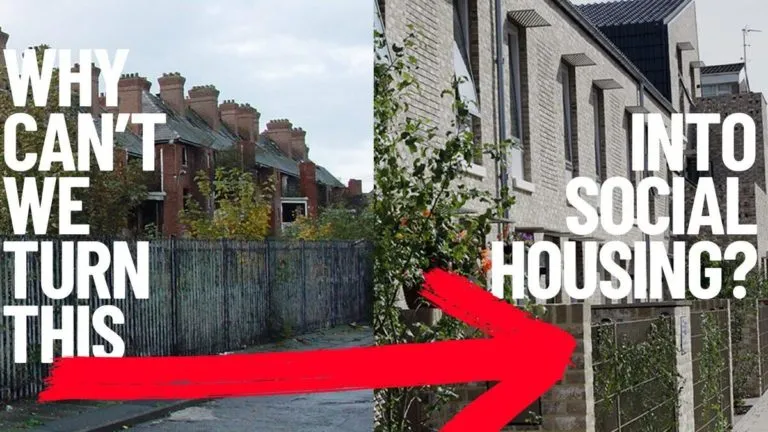It’s the ‘hope’ that kills social housing
Published: by Mike Thompson

Today MPs will get their first chance to debate the Levelling Up and Regeneration Bill. You would think that at first glance of the 338 pages of schedules and clauses, there is little to get excited about. A quick keyword search reveals that there is only one mention of social housing which is frustrating because we will never fix the housing emergency and truly level up the country, if we don’t get serious and build a new generation of genuinely affordable social housing.
But upon closer inspection and studying the policy paper that was published alongside the Bill, there are some measures that could, if done right, see many more social homes built.
The Bill represents an opportunity to change the rules around land and planning to ensure that the needs of communities are truly met, by making developers contribute more and bringing down the cost of land so councils can build more social homes.
Planning reforms and the infrastructure levy
The current planning system is broken. It does not deliver enough social homes that we so desperately need. This Bill could fix that.
Currently, councils can require developers to provide social housing as part of the planning permission process. This is known as a Section106 agreement and is currently the primary route through which social housing in England is delivered.
But too often developers under-deliver on their promises and councils don’t have the powers to hold them to these agreements. Last year only 2,829 social houses were delivered through Section 106 agreements. When you think that the council housing waiting list currently sits at 1.2 million households in England, this is nowhere near enough. Not by a long stretch.
The Bill intends on replacing Section 106 agreements with a flat tax on new developments, known as an ‘Infrastructure Levy’. This would make sure that developers pay their fair share to local councils.
The risk of this change is that instead of genuinely affordable social homes, more of the so-called ‘affordable housing’ is built (that’s only affordable to a select few), and land is not made available by developers. The small numbers currently built through gains in planning could drop further.
But there is an opportunity here. If the funds raised by the new levy are invested into social housing, and if social housing delivery is made an onsite requirement of any new development, we could improve on the numbers currently built.
Land reform and ‘hope value’
This will only happen if we do something about the ludicrous amount of money that landowners can currently demand from councils when they want to purchase their land for new homes or critical infrastructure.
Landowners can claim unfair amounts for their land due to the 1961 Land Compensation Act, which forces councils to pay a ‘hope value’ premium when making compulsory purchases. This hope value can be the potential value of the land if used for something like building luxury homes, rather than a fair price for a much better use – for example, building genuinely affordable social homes that local people desperately need.
It is this ‘hope value’ that kills social housing. It artificially inflates land values, making it extremely hard for councils to buy land to build social housing or get developers to deliver their fair share on private developments.
The promise of reform to land compensation, made in a policy paper published alongside the Bill, offers a glimmer of hope – or ‘no hope’ for social housing. The government has stated that it intends to introduce a measure that will ensure ‘fair compensation is paid’ for compulsory purchases and ’make the valuation of land in this context more akin to a normal market transaction.’
By scrapping hope value, landowners will still be able to make a healthy profit. But they won’t take the lion’s share of a development value for doing nothing.
Work by British think tank Civitas has estimated that reforming hope value could slash 38% off the total development costs of a new scaled-up programme of social housebuilding across England. This could reduce the total cost of building a new social rent home by up to a whopping £136,000 – savings that could be reinvested into more and better-quality social homes.
But scrapping hope value is not a done deal. We don’t know when the government will bring these clauses forward, or what its intended reforms are. It is a huge opportunity to get more social houses built, but we need to keep applying pressure to get it done.
Join the campaign
If you want to see councils #BuildSocialHousing you can join our campaign by signing our petition that calls on Michael Gove to scrap the unfair and outdated hope value.